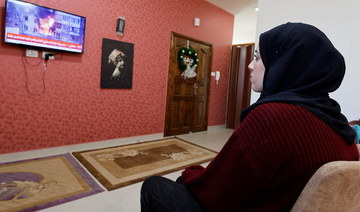LVIV: Three European prime ministers headed to Kyiv by train on Tuesday in a show of solidarity with Ukraine even as Russian air strikes and shelling hit the capital and invading forces tightened their grip.
At least five people were killed in the renewed bombardments on Kyiv on the 20th day of the Russian assault, authorities said. Buildings were set ablaze and people buried under the rubble.
In the besieged port city of Mariupol, about 2,000 cars managed to leave, ferrying civilians to safer areas, and a further 2,000 were waiting to follow, the city council said.
But a convoy with supplies for Mariupol, whose residents have been sheltering from repeated Russian bombardments and are desperate for food and water, was stuck at nearby Berdyansk, Deputy Prime Minister Iryna Vereshchuk said.
She accused Russia of lying about fulfilling agreements to help trapped civilians.
Peace talks between Russian and Ukrainian delegations via a video link resumed on Tuesday. Ukrainian officials played up hopes the war could end sooner than expected, saying Moscow may be coming to terms with its failure to impose a new government on Kyiv by force.
In a hint of compromise, Ukrainian President Volodymyr Zelenskiy said Kyiv was prepared to accept security guarantees that stop short of its long-term objective of membership of the NATO alliance, which Moscow opposes.
Where history is forged
The visit to Kyiv by the leaders of Poland, Slovenia and the Czech Republic was a symbol of Ukraine’s success so far in fending off an assault that Western countries believe was aimed at seizing the city weeks ago.
“It is our duty to be where history is forged. Because it’s not about us, but about the future of our children who deserve to live in a world free from tyranny,” Polish Prime Minister Mateusz Morawiecki said.
Czech and Polish officials said the mission was coordinated with the EU and agreed by its leaders at a summit last week. However, one official in Brussels said the trip posed serious security risks and could jeopardize negotiations.
About half of Kyiv’s 3.4 million population has fled and residents are spending nights sheltering in metro stations.
Two powerful explosions rocked Kyiv before dawn on Tuesday and tracer fire lit up the night sky. An apartment block was in flames after being struck by artillery.
Sitting on the ground outside, Igor Krupa said he survived because he had slept under a makeshift shelter of furniture and metal weights.
“All the windows went out and all the debris went into the apartment,” he said.
But despite reducing parts of cities to rubble, Russian forces have been halted at the gates of Kyiv and failed to capture any of Ukraine’s 10 biggest cities since President Vladimir Putin ordered the invasion on Feb. 24.
Still, hundreds of civilians have been killed and nearly 3 million people, mostly women and children, have fled Ukraine for safety in neighboring countries.
On the Romanian border, a woman named Tanya, who crossed the Danube River to safety, said she had fled the southern frontline town of Mykolaiv to save her child. “Because the people that are there now are Russians, Russian soldiers, and they kill children.”
Positive signs
Zelenskiy, who has won admiration in the West for his leadership under fire, called on Russian troops to surrender.
“You will not take anything from Ukraine. You will take lives,” he said in a video message. “But why should you die? What for? I know that you want to survive.”
He also indicated Kyiv might be ready to compromise on its aspirations for NATO membership — a factor that has riled Moscow.
“If we cannot enter through open doors, then we must cooperate with the associations with which we can, which will help us, protect us...and have separate guarantees.”
Kremlin spokesperson Dmitry Peskov said it was too early to predict progress in peace talks: “The work is difficult, and in the current situation the very fact that (the talks) are continuing is probably positive.”
One of Zelenskiy’s top aides said the war would be over by May or even within weeks as Russia had run out of fresh troops.
“We are at a fork in the road now,” Oleksiy Arestovich said in a video. He said he expected either a peace deal within one or two weeks or another Russian attempt with new reinforcements, which could prolong the conflict for another month.
At the United Nations, Russian envoy Vassily Nebenzia said Moscow would end what it calls its “special military operation” when its goals were achieved.
War grinds on
In Rivne in western Ukraine, officials said 19 people had been killed in a Russian air strike on a TV tower. If confirmed it would be the worst attack on a civilian target so far in the northwest where Russian ground troops have yet to tread.
Russia denies targeting civilians.
The peace talks have focused so far on local cease-fires to let civilians evacuate and bring aid to surrounded cities.
Russia has had more success in southern Ukraine, saying on Tuesday it now controlled the entire Kherson region. Reuters could not independently verify the claim
The conflict has brought economic isolation upon Russia. The United States, the European Union and Britain announced further sanctions on Tuesday, while Moscow retaliated by putting US President Joe Biden and other top officials on a “stop list” that bars them from entering Russia.
The invasion has also prompted a near total crackdown on free speech in Russia, with all major independent media shut and Western social media apps switched off.
An employee of the main state TV channel stood behind an anchor during a news broadcast on Monday and held up an anti-war sign.
Marina Ovsyannikova was quickly arrested. The Kremlin called her protest “hooliganism” and RIA news agency later reported she had been fined 30,000 roubles ($280) for flouting protest legislation.






















